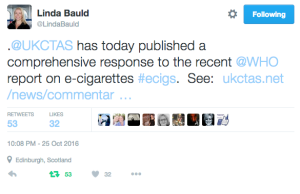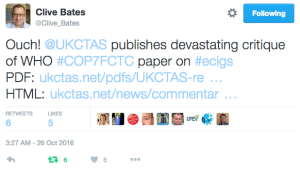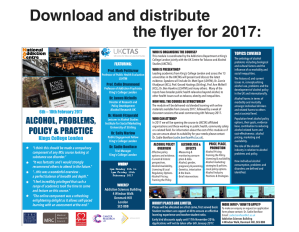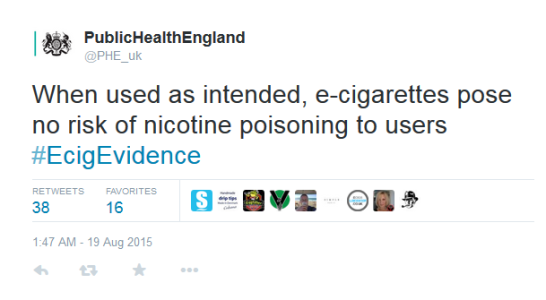A new WHO report fails to properly evaluate the evidence on e-cigarettes and could even undermine international efforts to reduce smoking, says a group of UK based academics.
UK academics are calling for better understanding of the potential benefits of e-cigarettes to reducing the smoking pandemic ahead of an international gathering of countries that have signed the World Health Organisation’s Framework Convention for Tobacco Control.
The 7th session of the Conference of the Parties (COP) of the Framework Convention on Tobacco Control (FCTC), a global public health treaty, will be held in Delhi, India from 7th-12th November 2016. At this meeting, Parties to the treaty (countries and other jurisdictions) will discuss whether similar policy measures recommended to reduce tobacco use should be applied to e-cigarettes.
In advance of the COP the World Health Organisation published a report about Electronic Nicotine Delivery Systems (ENDS) and Electronic Non-Nicotine Delivery Systems (ENDDS), also known as e-cigarettes. This aimed to summarise the evidence about these devices.
Academics from the UK Centre for Tobacco and Alcohol Studies, a UKCRC Public Health Research Centre of Excellence, have today published a robust critique of the WHO report setting out a series of concerns about the content of the document which, in their view,  does not fairly represent existing evidence on e-cigarettes. Their critique examines each element of the WHO report and identifies flaws in the way the evidence is presented and problems with how the report could be interpreted, potentially encouraging countries to adopt excessive restrictions on e-cigarettes which could undermine efforts to reduce smoking.
does not fairly represent existing evidence on e-cigarettes. Their critique examines each element of the WHO report and identifies flaws in the way the evidence is presented and problems with how the report could be interpreted, potentially encouraging countries to adopt excessive restrictions on e-cigarettes which could undermine efforts to reduce smoking.
The UKCTAS critique points to evidence set out in the recent Royal College of Physician’s’ report ‘Nicotine without Smoke’ and subsequent research which recognise that e-cigarettes are far less harmful than smoking and that smokers who find it difficult to stop should be encouraged to use them.
The WHO report fails to accurately present what is already known about e-cigarettes. In particular, it: positions e-cigarettes as a threat rather than an opportunity to reduce smoking; fails to accurately quantify any risks of e-cigarettes compared with smoking; misrepresents existing evidence about any harms to bystanders; discounts the fact that e-cigarettes are helping smokers to quit; does not recognise the place of some promotion of e-cigarettes to encourage smokers to switch to these less harmful products; fails to understand that the flavours in e-cigarettes are useful for people trying to stop smoking; mischaracterises the current e-cigarette market  and appears to support very restrictive policies on e-cigarettes without including any good policy analysis. In addition, the WHO report does not acknowledge that significant restrictions on e-cigarettes could lead to unintended consequences, including increases in smoking.
and appears to support very restrictive policies on e-cigarettes without including any good policy analysis. In addition, the WHO report does not acknowledge that significant restrictions on e-cigarettes could lead to unintended consequences, including increases in smoking.
Finally, the researchers point out that the WHO briefing is based on four unpublished papers which are still undergoing peer review, which does not allow for open, transparent scrutiny of the evidence. This does not, therefore, provide a good basis for policy making and risks undermining rather than promoting the aims of the FCTC, which is a treaty that was designed to help countries reduce smoking rates and save lives.
Continue reading →
 “Great range of content and world-class speakers. Organisers did an amazing job including looking after us all while we were here. The mix of lectures / Q & As / panel discussions was great. Really worth taking time away from work/home to attend this.”
“Great range of content and world-class speakers. Organisers did an amazing job including looking after us all while we were here. The mix of lectures / Q & As / panel discussions was great. Really worth taking time away from work/home to attend this.” “Extremely informative course and relevant to current alcohol policy challenges. Good venue, convenient location and lovely setting. Module well organised and brilliant range of speakers.”
“Extremely informative course and relevant to current alcohol policy challenges. Good venue, convenient location and lovely setting. Module well organised and brilliant range of speakers.” “Thank you very much. It was a great privilege to listen and attend this course. Lectures and lecturers were outstanding.”
“Thank you very much. It was a great privilege to listen and attend this course. Lectures and lecturers were outstanding.” “Very informative useful training, well worth my time and travel.”
“Very informative useful training, well worth my time and travel.” “Wonderful networking opportunity.”
“Wonderful networking opportunity.” “Thank you for such a brilliant training event – the content was spot on, all the presentations and sessions were really, really good and I came away feeling that I had learned masses: a rich diet of fact and opinion. I can honestly say that I have rarely – if ever – enjoyed such an event quite as much as this one.”
“Thank you for such a brilliant training event – the content was spot on, all the presentations and sessions were really, really good and I came away feeling that I had learned masses: a rich diet of fact and opinion. I can honestly say that I have rarely – if ever – enjoyed such an event quite as much as this one.” 








 The introduction of standardised (or ‘plain’) packaging was recommended by the World Health Organisation, Framework Convention on Tobacco Control (WHO FCTC) guidelines. This recommendation was based on evidence around tobacco promotion in general and studies which examined the impact of changes in packaging on knowledge, attitudes, beliefs and behaviour. Standardised tobacco packaging places restrictions on the appearance of tobacco packs so that there is a uniform colour (and in some cases shape) with no logos or branding apart from health warnings and other government-mandated information, and the brand name appears in a prescribed uniform font, colour and size.
The introduction of standardised (or ‘plain’) packaging was recommended by the World Health Organisation, Framework Convention on Tobacco Control (WHO FCTC) guidelines. This recommendation was based on evidence around tobacco promotion in general and studies which examined the impact of changes in packaging on knowledge, attitudes, beliefs and behaviour. Standardised tobacco packaging places restrictions on the appearance of tobacco packs so that there is a uniform colour (and in some cases shape) with no logos or branding apart from health warnings and other government-mandated information, and the brand name appears in a prescribed uniform font, colour and size.






